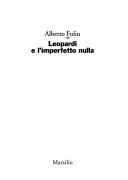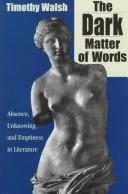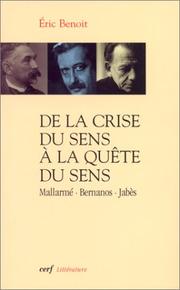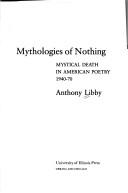| Listing 1 - 10 of 10 |
Sort by
|

ISBN: 8831777874 Year: 2001 Publisher: Venezia : Marsilio,
Abstract | Keywords | Export | Availability | Bookmark
 Loading...
Loading...Choose an application
- Reference Manager
- EndNote
- RefWorks (Direct export to RefWorks)

ISBN: 0809321726 Year: 1998 Publisher: Carbondale (Ill.) : Southern Illinois university press,
Abstract | Keywords | Export | Availability | Bookmark
 Loading...
Loading...Choose an application
- Reference Manager
- EndNote
- RefWorks (Direct export to RefWorks)
Literature --- Nothing (Philosophy) in literature. --- Sunyata. --- History and criticism.
Book
ISBN: 9780429896973 0429475195 1283113082 9786613113085 1849405557 0429914199 9780429914195 9781849405553 9781780494531 178049453X 9781855754447 1855754444 Year: 2007 Publisher: London Karnac
Abstract | Keywords | Export | Availability | Bookmark
 Loading...
Loading...Choose an application
- Reference Manager
- EndNote
- RefWorks (Direct export to RefWorks)
"A commonly encountered experience of both analyst and analysand is that of the void. It is spoken about at different stages of therapy and refers to experiences that have different origins. Sometimes the experience of the void is around a relatively limited aspect of the psyche but at other times the void seems much more global and threatens to engulf the entire personality; the whole individual psyche then seems threatened by the possibility of dissolution into nothingness. The void experience may result from the early failure of external objects to meet the needs of the developing ego, which leads to the sorts of primitive terrors that Winnicott described, or it may result when the Self itself seems threatened with annihilation, which may be more to do with a rupturing of the ego-Self axis. In the first case the fear is of disintegration, whereas in the second the experience is one of the living dead, as though the individual is cut off from her life source. But more than that, the intrusion of the void into the conscious experience of so many of us implies that its occurrence is not only the result of severe trauma but also a necessary aspect of the individuation process. Drawing on the writings of Jung and post-Jungians, and Psychoanalytic thinkers such as Bion, Winnicott and Bick, as well as on poetry, mythology and art, and illustrating these ideas with dreams and other material drawn from his practice, the author here attempts to illuminate some of the compartments of that immense space."--Provided by publisher.
Nothing (Philosophy) --- Nothing (Philosophy) in literature. --- Consciousness. --- Psychoanalysis.
Book
ISBN: 9781501331961 Year: 2017 Publisher: London Bloomsbury Academic
Abstract | Keywords | Export | Availability | Bookmark
 Loading...
Loading...Choose an application
- Reference Manager
- EndNote
- RefWorks (Direct export to RefWorks)
Book
ISBN: 1461945461 1438448333 9781461945468 9781438448336 9781438448312 1438448317 9781438448329 1438448325 Year: 2013 Publisher: Albany
Abstract | Keywords | Export | Availability | Bookmark
 Loading...
Loading...Choose an application
- Reference Manager
- EndNote
- RefWorks (Direct export to RefWorks)
"Explores the rise of the idea of nothing in Western modernity and how this idea is transforming and offering new possibilities"--Provided by publisher.
Nothing (Philosophy) --- Postmodernism. --- Hermeneutics --- Nothing (Philosophy) in literature. --- Nothingness (Philosophy) --- Nihilism (Philosophy) --- Ontology --- Post-modernism --- Postmodernism (Philosophy) --- Arts, Modern --- Avant-garde (Aesthetics) --- Modernism (Art) --- Philosophy, Modern --- Post-postmodernism --- Nothingness in literature --- Interpretation, Methodology of --- Criticism --- Philosophy. --- Nothing (Philosophy) in literature --- Postmodernism --- Philosophy --- Hermeneutics.
Book
ISBN: 2718190973 Year: 1998 Publisher: [Paris] : SEDES,
Abstract | Keywords | Export | Availability | Bookmark
 Loading...
Loading...Choose an application
- Reference Manager
- EndNote
- RefWorks (Direct export to RefWorks)
Nothing (Philosophy) in literature. --- Comparative literature --- Littérature comparée --- Italian and French --- French and Portuguese. --- Portuguese and Italian. --- Italienne et française --- Leopardi, Giacomo, --- Baudelaire, Charles, --- Pessoa, Fernando, --- Criticism and interpretation.
Book
ISBN: 9781501307218 Year: 2015 Publisher: New York London New Delhi [etc.] Bloomsbury Academic
Abstract | Keywords | Export | Availability | Bookmark
 Loading...
Loading...Choose an application
- Reference Manager
- EndNote
- RefWorks (Direct export to RefWorks)
"The concept of nothing has been an enduring concern of the 20th century. As Martin Heidegger and Jean-Paul Sartre each positioned nothing as inseparable from the human condition, essential to the creation or operation of human existence,as Jacques Derrida demonstrated how all structures are built upon a nothing within the structure, and as mathematicians argued that zero - the number that is also not a number - allows for the creation of our modern mathematical system, Narrative of Nothing in 20th-Century Literature suggests that nothing itself enables the act of narration. Focusing on the literary works of Vladimir Nabokov, Samuel Beckett, and Victor Pelevin, Meghan Vicks traces how and why these writers give narrative form to nothing, demonstrating that nothing is essential to the creation of narrative-how our perceptions are conditioned, how we make meaning (or madness) out of the stuff of our existence, how we craft our knowable selves, or how we exist in language"-- "Explores how 20th-century literature gives narrative form to nothing and why nothing is essential to the creation of being, narrative, and other systems of meaning-making"--
Nothing (Philosophy) in literature. --- Narration (Rhetoric) --- LITERARY CRITICISM / Semiotics & Theory. --- LITERARY CRITICISM / European / Eastern (see also Russian & Former Soviet Union). --- LITERARY CRITICISM / European / French. --- Nabokov, Vladimir Vladimirovich --- Beckett, Samuel --- Pelevin, Viktor --- Criticism and interpretation.
Book
ISBN: 8473171640 Year: 1986 Publisher: Madrid
Abstract | Keywords | Export | Availability | Bookmark
 Loading...
Loading...Choose an application
- Reference Manager
- EndNote
- RefWorks (Direct export to RefWorks)
Hope in literature --- Nothing (Philosophy) in literature --- 860 "19" SABATO, ERNESTO --- Nothingness in literature --- 860 "19" SABATO, ERNESTO Spaanse literatuur--20e eeuw. Periode 1900-1999--SABATO, ERNESTO --- Spaanse literatuur--20e eeuw. Periode 1900-1999--SABATO, ERNESTO --- Sábato, Ernesto R. --- Sábato, Ernesto R., --- Criticism and interpretation. --- Sábato, Ernesto

ISBN: 2204068101 9782204068109 Year: 2001 Publisher: Paris: Cerf,
Abstract | Keywords | Export | Availability | Bookmark
 Loading...
Loading...Choose an application
- Reference Manager
- EndNote
- RefWorks (Direct export to RefWorks)
Mallarmé, Bernanos, Jabès. L'athée, le chrétien, le juif. Trois écrivains qu'apparemment tout sépare. Mais la question du livre, si importante chez Mallarmé, réapparaît chez Jabès ; la question de Dieu et du néant, déjà présente chez Mallarmé, devient fondamentale chez Bernanos et Jabès. La question du rapport à l'histoire, dont on perçoit le souci dans certains textes de Mallarmé, trouve dans les œuvres de Bernanos et Jabès un déploiement dramatique. Le livre, Dieu, l'histoire. A travers les thèmes essentiels de leur œuvre, Mallarmé, Bernanos et Jabès sont les témoins privilégiés de la crise de sens et de l'effacement de la transcendance dans la pensée et la vie de l'homme contemporain. Mort de Dieu et de l'Idéal chez Mallarmé, déréliction et tentation du désespoir chez Bernanos, sentiment de l'absence de Dieu chez Jabès. A cette crise de sens, les écrivains répondent dans leur œuvre par une tentative audacieuse et prophétique de reconquête du sens
Comparative literature --- Mallarmé, Stéphane --- Bernanos, Georges --- Jabès, Edmond --- Meaning (Philosophy) in literature --- God in literature --- History and literature --- Signification (Philosophie) dans la littérature --- Dieu dans la littérature --- Histoire et littérature --- Mallarmé, Stéphane, --- Bernanos, Georges, --- French literature --- Nothing (Philosophy) in literature --- History and criticism --- Criticism and interpretation --- Literature and history. --- Signification (Philosophie) dans la littérature --- Dieu dans la littérature --- Histoire et littérature --- Mallarmé, Stéphane, --- Jabès, Edmond --- French literature - 20th century - History and criticism --- French literature - 19th century - History and criticism --- Jabès, Edmond, --- Mallarmé, Stéphane, - 1842-1898 - Criticism and interpretation --- Bernanos, Georges, - 1888-1948 - Criticism and interpretation --- Jabès, Edmond - Criticism and interpretation --- Mallarmé, Stéphane, - 1842-1898 --- Bernanos, Georges, - 1888-1948

ISBN: 0252010493 Year: 1984 Publisher: Urbana : University of Illinois Press,
Abstract | Keywords | Export | Availability | Bookmark
 Loading...
Loading...Choose an application
- Reference Manager
- EndNote
- RefWorks (Direct export to RefWorks)
American poetry --- 20th century --- History and criticism --- Death in literature --- Mysticism in literature --- Eliot, Thomas Stearns --- Criticism and interpretation --- Stevens, Wallace --- Williams, William Carlos --- Lowell, Robert Traill Spence, Jr. --- Roethke, Theodore --- Plath, Sylvia --- Bly, Robert Elwood --- Merwin, William Stanley --- Negativity (Philosophy) in literature --- Nothing (Philosophy) in literature. --- Negation (Logic) in literature --- Poésie américaine --- Mort dans la littérature --- Mysticisme dans la littérature --- Négativité (Philosophie) dans la littérature --- Négation (Logique) dans la littérature --- Histoire et critique --- Death in literature. --- Mysticism in literature. --- Negation (Logic) in literature. --- Negativity (Philosophy) in literature. --- History and criticism.
| Listing 1 - 10 of 10 |
Sort by
|

 Search
Search Feedback
Feedback About UniCat
About UniCat  Help
Help News
News